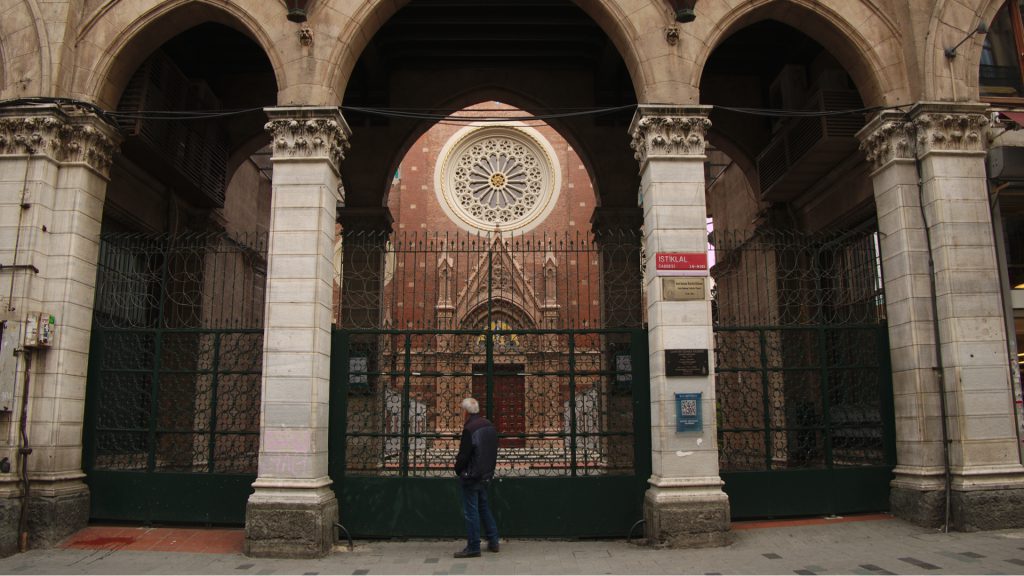
Published April 10, 2020
Churches are usually packed this week, the holiest on the Christian calendar. But this year, with very few exceptions, they are empty. And not just in America. In Jerusalem’s Old City, the Church of the Holy Sepulcher, a major pilgrimage center for Christians all over the world, was closed. The last time it was closed to the public for a sustained period was during the Black Plague in the 14th century. At the Vatican, Pope Francis stood alone, speaking before a huge, empty square. “We find ourselves afraid,” he said. “And lost.”
The coronavirus pandemic of 2020 is doing what wars, depressions and natural disasters have not: shutting down places of worship for Christians all over the world.
I asked several theologians and ministers how they are processing this moment.
“There is a fundamental challenge to church work when the assembly cannot assemble,” the Rev. Chris Davis of Groveton Baptist Church in Alexandria, Va., told me. “The 59 ‘one another’ commands of the New Testament — love one another, forgive one another, rejoice with one another, bear with one another — show how deep and rich the relationships in the church are intended to be. As wonderful as Zoom, Facebook Live and texting are, they cannot facilitate the kind of interactions necessary for such relationships.”
There are additional complications when it comes to pastoral care. In-person crisis counseling, comforting people as they die and consoling loved ones in the wake of death is far more difficult. Weddings and funerals are being postponed; so are the sacraments of baptism and communion.
“We are retooling everything we do to meet the needs of the current moment,” the Rev. James Forsyth, senior pastor of McLean Presbyterian Church in Virginia (where I attend), told me. “Worship, community and missions look very different in this time. But they are all geared toward accomplishing the same ends as before — bring the hope and healing of Jesus to our own souls and to a world in need. In other words, the vision remains unchanged, but the methods have adapted.”
“The fact that we are not at church doesn’t keep us from being the church,” Mr. Forsyth said.
The Rev. Dr. Heather Shortlidge, pastor at New York Avenue Presbyterian Church in Washington, told me that her congregation experienced its first Covid-19-related death last Sunday. “I feel like I’m handing out life jackets of hope in a sea of despair,” she said, “pointing people toward God and the holy, even as the ground beneath us and the scenery has shifted dramatically.”
A few pastors told me that churches are experiencing a sense of community that is in some respects greater than in the past. People are calling one another spontaneously. Individuals who had slipped through the cracks are now being contacted. In some churches, weekly “attendance” is actually growing as a result of live-streaming. Community groups, Bible studies and Sunday school classes are being conducted via videoconferencing.
At the same time, the Rev. Dr. Tim Keller, founding pastor of Redeemer Presbyterian Church in Manhattan, pointed out, churches in working-class and poorer sections of the cities are really being devastated, with most or all of the congregants out of work. “Many of these churches also have little ability to live-stream or connect to their members by internet,” he told me. “These churches always have been fragile financially and many of them are at risk of dying.”
When I asked the Rev. Dr. Scott Dudley, senior pastor at Bellevue Presbyterian Church in Bellevue, Wash., what he hopes will be said of Christians when the history of this pandemic is written, he told me, “This is an enormous opportunity for Christians to show the world what we are for rather than all the many things they’ve heard us say that we’re against.”
Citing the work of Rodney Stark, a sociologist of religion, Pastor Dudley told me that one of the reasons Christianity grew so rapidly is when plagues hit the Roman Empire and so many people, including physicians, rushed out of the city, Christians rushed in to care for the sick, often dying themselves as they did so.
“That kind of sacrificial love coupled with incredible courage convinced an unbelieving world that Jesus was Lord,” Pastor Dudley said. How we live out sacrificial love will be different from early Christians did, he acknowledged. We know more about diseases and how they spread than they did, so we need to follow social-distancing guidelines, but the principle of healing the wounded still applies.
“If, in this pandemic, Christians care first and care most, we may find ourselves in a whole different dialogue between the church and our culture than what has been primarily a very toxic dialogue,” Pastor Dudley said. “Jesus, Christians and the church may have a better reputation if we rush into care with courage and sacrificial love.”
What the church can also offer the world, according to the Rev. Dr. Bill Fullilove, a pastor at McLean Presbyterian Church and an Old Testament scholar, is a reason to care for others — because, as he put it, “we view each of these men, women and children — no matter their belief or behavior or anything else — as being made in the image of God and therefore inherently valuable.” Christianity provides a kind of anthropology of care and solidarity with others, including those living in the shadows of society.
Leaning into the world’s pain during a pandemic can be done in a way that respects social distancing. Ministers told me their churches are donating surgical masks, reallocating significant sums of money toward Covid-19 relief and hiring laid-off restaurant workers to make meals for the unemployed. They are aiding homeless shelters and purchasing tablets that allow distance learning for schools serving children of low-income families. Congregants are signing up to bring food to those in need, with younger people volunteering to pick up groceries for older people. Some are offering their facilities to be used by cities in any way they need, including as field hospitals if necessary.
None of these acts of generosity is unique to churches, but they are characteristic of many of them. According to Peggy Wehmeyer, a former religion correspondent for ABC who attends Highland Park United Methodist in Dallas, “I think it will change this historic church forever.”
Some high-profile Christians presume they can divine the messages God is sending the world through suffering, natural disasters and pandemics. But most Christians I know, and all of those with whom I was in touch, wisely stay away from attempting to answer the “Why?” question. They point to the prophet Job, whose friends were rebuked by God for trying to do precisely that. And it was Jesus, in the agony on the cross, who cried out, “My God, My God, why hast thou forsaken me?” If God didn’t see fit to answer Job or Jesus, God is not likely to feel the need to answer us.
What those of us who are Christians do believe is not only that God entered a world filled with suffering but also that through the incarnation God sided with those who suffer and suffered himself. Jesus grew weary. He grieved. He wept. And in anguish at the Mount of Olives, just before he was betrayed, the Gospel of Luke tells us that Jesus “prayed more earnestly, and his sweat was like drops of blood falling to the ground.”
What the Christian church can provide at its best is the ability to suffer with hope.
The theologian Tremper Longman pointed out to me that even the darkest of all Psalms, Psalm 88, which ends with the words “darkness is my closest friend,” speaks of “the God who saves me” — a God to whom the Psalmist cries out to day and night.
In my conversations, several people used the word “lament” to describe how we ought to respond to this moment. The Rev. Sharol Hayner told me that a key part of prayer is lamentation: “I led the Prayers of the People in worship and we lamented. We lamented the losses, the changes we’ve all experienced, the deaths and the very existence of this virus that has turned our whole world upside-down.”
Kerry Dearborn, professor emerita at Seattle Pacific University, where she taught theology, told me: “We lament, not because of the false belief that God is punishing us through this pandemic, but because our ways of life have left so many vulnerable and with so few resources to deal with an epidemic like this. And we lament knowing that God laments with us, and in Jesus lived in solidarity with our pain, and died to heal and liberate us from all brokenness, shame, guilt and self-centeredness.”
If Christians are wise, we will emerge from this pandemic as different and better people: more kind and generous, more able to mourn with those who mourn, more able to model how love can cast out fear. “There is always reason to hope,” the priest and author Henri Nouwen wrote, “even when your eyes are filled with tears.”
For a world in the grips of a pandemic, this is a time of tears. For Christians it is as well. But it doesn’t end there. The anguish of Good Friday gives way to the glory of Easter Sunday. The hope of what awaits transforms the experience of waiting. But waiting isn’t always easy. We live in a broken world, and there are moments when darkness feels like our closest friend.
Peter Wehner, a senior fellow at the Ethics and Public Policy Center, served in the previous three Republican administrations and is a contributing Opinion writer, a visiting professor at Duke and the author of The Death of Politics: How to Heal Our Frayed Republic After Trump.








